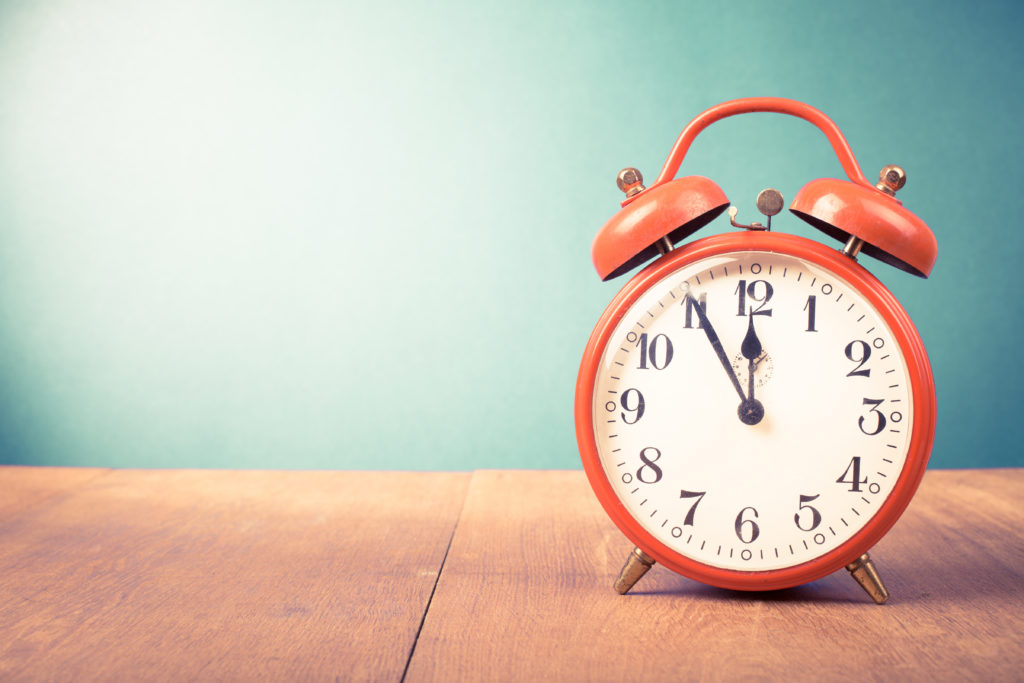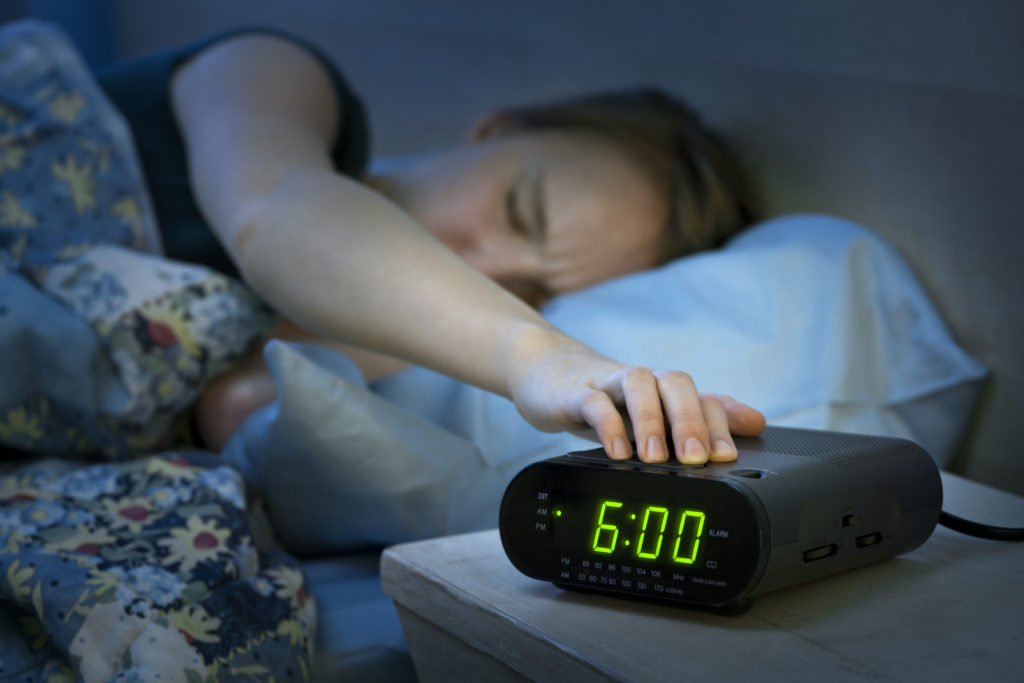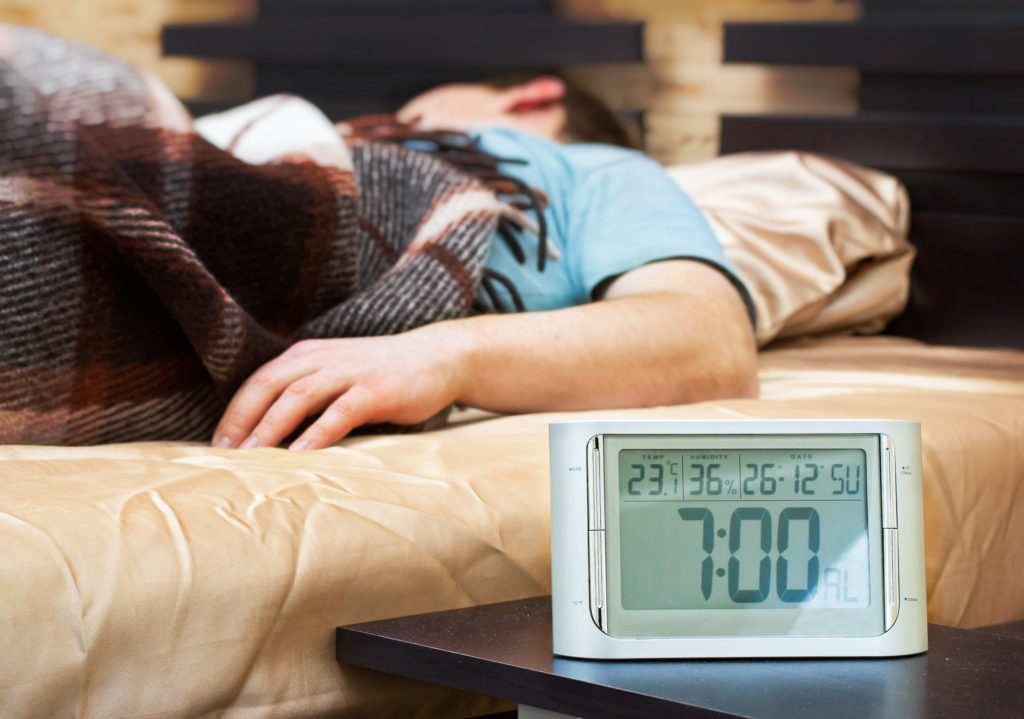Daylight saving time (DST) is just around the corner.
A one-hour disruption may not seem like a big deal — but research suggests daylight saving time can wreak havoc on our sleep and overall wellbeing.
The basic idea behind DST is that it saves energy, because Americans can use sunlight until later in the evening rather than relying on electricity. However, a 2008 study from the U.S. Department of Energy found DST only reduced annual energy use by a measly 0.03 percent (1).
So is it really worth it? From a health standpoint — maybe not.
 BrAt82/Shutterstock
BrAt82/Shutterstock
The Trouble with Changing Our Clocks
Why might bumping our clocks back or forward by one hour have negative consequences for our health?
Christopher Barnes, a researcher who studies sleep deprivation, breaks it down for CNN: “When we change the time by one hour, it throws a monkey wrench into our circadian process,” he says. This makes it more likely that people will struggle to fall and stay asleep, thereby increasing the odds they’ll be sleep deprived the next morning.
In fact, Barnes says people typically obtain less sleep in the days after daylight saving time kicks into effect. “The following Monday, we’ve discovered that people have about 40 minutes less sleep,” Barnes told CNN. “Because we’re already short on sleep, to begin with, the effects of even 40 minutes are noticeable.”
Barnes isn’t kidding when he says Americans are already short on sleep. The Centers for Disease Control and Prevention (CDC) reports that more than one-third of American adults fail to obtain enough sleep on a regular basis. A one-hour time change can further exacerbate this sleep deprivation.
As we all know, sleep deprivation is linked to a number of nasty side effects including fatigue, trouble concentrating, cognitive impairment, diminished physical performance, impaired work performance, irritability, mood swings, drowsy driving, and an increased risk of both short-term and chronic illness.
As if that wasn’t bad enough, there may be other health risks involved with daylight saving time.
 Guschenkova/Shutterstock
Guschenkova/Shutterstock
Why “Spring Forward” May Be Bad For Our Health
In addition to provoking sleep deprivation, the advent of daylight saving time has been linked to some other nasty effects. For example:
- A 2014 study published in the journal Open Heart suggests more people tend to have heart attacks on the Monday after the clocks “spring ahead” (2).
- Another study, which was presented to the American Academy of Neurology in 2016, found people are at an increased risk for stroke in the two days after the clocks move forward (3).
- According to LiveScience, further research has linked DST with more car accidents, higher rates of workplace injuries, and an increased risk of people developing cluster headaches.
In spite of these downsides, most of the U.S. currently observes daylight saving time, with the exception of Hawaii and Arizona (though LiveScience says both the Navajo Nation and the Hopi reservation in Arizona do observe DST).
Various scientists, economists, and politicians have suggested changing or abolishing DST — and an online petition asking Congress to get rid of DST has over 150,000 signatures — but it doesn’t seem likely that things will change anytime soon.
 Elena Elisseeva/Shutterstock
Elena Elisseeva/Shutterstock
Why “Fall Back” Isn’t So Great Either
Most of us can agree that the start of daylight saving time isn’t great for our sleep, because it amounts to losing approximately one hour of sleep for at least one night. But doesn’t the end of DST (aka “fall back”) give us a chance to enjoy an extra hour of snooze time?
The consensus among experts seems to be: “not really.”
Experts from Harvard Medical School suggest many people don’t take advantage of the extra hour of sleep. This might be due to external obligations, or it might result from the fact that the fall time change (just like the spring one) messes with our circadian rhythms, thereby increasing the odds that we’ll experience sleep disruptions.
What’s more, a 2013 review published in the journal Sleep Medicine Reviews found the fall time change can result in a net loss of sleep for up to one week following the shift (4). That’s because people tend to have trouble falling and staying asleep in the days after a time change, and they’re also more likely to wake up earlier.
All told, the end of daylight saving time tends to result in a loss of sleep as opposed to giving us an extra hour of Zzzs each night.
 luckyraccoon/Shutterstock
luckyraccoon/Shutterstock
Daylight Saving Time: The Silver Lining
If there’s one good thing to be said about DST, it’s this: The semi-annual time changes offer a great opportunity to reset your sleep habits.
Anyone who struggles to get enough sleep (either during the time change or at any other time of the year) would do well to improve their sleep hygiene. That’s doable with the following tips:
- Keep your bedroom cool, dark, and quiet.
- Don’t use the bedroom for any activity other than sleeping or sex.
- Avoid blue-light-emitting electronics in the hours leading up to bed.
- Commit to going to bed and waking up at the same time every day.
- Avoid consuming alcohol or caffeine in the hours prior to your bedtime.
- Make your sleep space as comfortable as possible by investing in a mattress, pillows, and sheets that you love.
- Adopt a soothing bedtime routine to help your mind and body unwind before hitting the sheets.
If you think the time change will interfere with your sleep schedule and make you unusually tired, the National Sleep Foundation says you should take a nap on Sunday in the early afternoon to increase your chances of feeling well-rested on Monday morning. And don’t forget to change your clocks — even though it’s a pain!
[Editor’s Note: The information provided should not be considered a substitute for professional advice. Please consult a sleep doctor or other medical expert if you have questions related to your own health.]
References
- Belzer DP et al. Impact of Extended Daylight Saving Time on National Energy Consumption. Report to Congress. 2008.
- Sandhu A et al. Daylight savings time and myocardial infarction. Open Heart. 2014; 1: e000019.
- Ruuskanen J et al. Does Daylight Saving Time Increase Risk of Stroke? Presentation to the American Academy of Neurology. 2016.
- Harrison, Y. The impact of daylight saving time on sleep and related behaviours. Sleep Medicine Reviews. 2013. Vol. 17; Issue 4 (285-292).
Featured image: Alexey Wraith/Shutterstock
